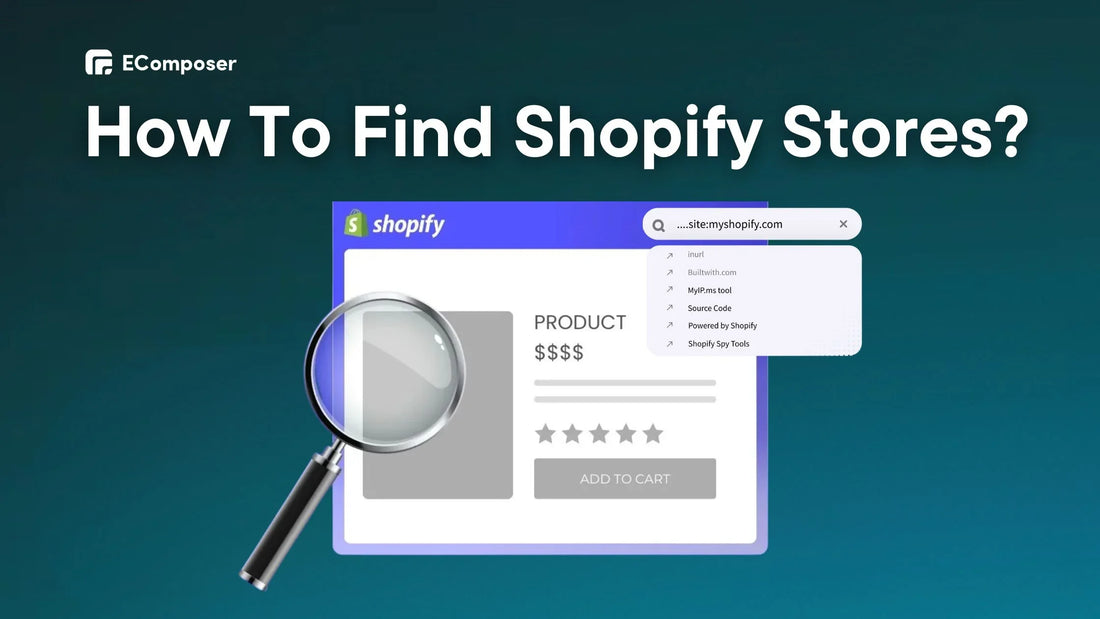5 Ways To Find Shopify Stores In Your Niche

Table Of Contents
Are you wondering how to find Shopify stores? With over 4.8 million websites powered by Shopify across 175 countries, there's a good chance you'll encounter them in your niche.
Whether you're a seasoned entrepreneur or just starting, this guide provides five strategies for finding inspirational Shopify shops in your niche.
Why Should You Find Other Shopify Stores?
While Shopify is popular, researching the market before choosing might be wise. Here are two main reasons why investigating other Shopify companies can be helpful to:
Competitor Analysis

The competition is intense, with 4.61 million Shopify-powered active websites. That's where competitor analysis comes in. As the adage goes, sometimes our neighbors have the most significant ideas. It's a fantastic tool that lets you get substantial ideas just by watching what others do.
Analyzing your rivals' marketing, product, and customer service tactics might reveal market possibilities. This lets you identify your brand and establish your e-commerce niche.
Also, you can see trends before they burst. If your competitors are doing well, you should change your selling. This proactive plan helps your Shopify company grow by letting you know what customers want.
Read more: Top Shopify Spy Tools for Competitor Research.
Consider If Shopify Is Suited For Your Company
Every platform is flawed, not even Shopify. By investigating different Shopify shops, you may discover possible issues in your sector.
For example, even if Shopify can handle a large number of goods. Its inventory management may not be enough for companies with tens of thousands of SKUs or customized products. They might do better with a more advanced e-commerce inventory control system for businesses.
Doing preliminary research may save you time and money in the long run. In the next section, we'll examine this valuable research tool and how Shopify may benefit your company.
Read more: Compare Shopify Plus vs Shopify.
How To Find Shopify Stores?
Now that we know the benefits of learning from successful Shopify businesses in your area, we can provide concrete solutions. We'll look at five efficient ways to help you find these Shopify shops:
Option 1: Search "site:myshopify.com" On Google
Google provides a useful technique for locating particular websites: the "site:myshopify.com" search operator. This enables you to search directly inside URL addresses, including "myshopify.com."
For example, if you're looking for a t-shirt, type "site:myshopify.com t-shirt" into the search field. This strategy narrows down results to Shopify-powered websites that have your chosen keywords in the URL.

Look for Shopify t-shirt businesses by searching "site:myshopify.com."
However, this strategy works for certain shops but has drawbacks. Many successful Shopify firms use bespoke domains, removing the "myshopify.com" subdomain.
Learn how to change shopify URL structure.
Option 2: Check For "Powered by Shopify" In The Footer
Another way to identify Shopify-based shops is to notice "Powered by Shopify." They added this strategy to this list after I saw a few details in the Shopify store's footer.
Many smaller companies or startups may maintain the "Powered by Shopify" tag to promote their e-commerce platform and gain brand recognition.

Find the phrase "Powered by Shopify" in the footer.
However, many well-known Shopify businesses buy custom names to make their sites look more professional and unique to their brand. They would have removed the "Powered by Shopify" footers.
Luckily, they aren't your only option. In the following sections, we'll discuss more methods for constructing a thorough approach to finding specialized Shopify shops.
Read more: Methods for Making Your Own Shopify Footer.
Option 3: Use Tools
To help you with your search, let's look at some e-commerce research tools. Here, we'll go over three excellent alternatives for helping you find Shopify shops in your niche:
3.1. Use MyIP.ms Tool
The first tool that we'd like to highlight is IP address checking. Shopify shops are all hosted on the same server as Shopify Inc. As a result, we should extract data for all shops with the ID address 23.227.38.0, which is Shopify Inc.'s ID address.
Here are the steps you should follow:
Step 1: Go to MyIpMS and type 23.227.38.0 into Whois Lookup.

Step 2: Select "Other Sites on IP" to see all current Shopify shops in the "Owner IP Range" section. You must verify your humanity.

Step 3: Scroll down to view Shopify shop entries in the "Known Websites between IP: 23.227.38.0 - 23.227.38.255" table.

For information, click "View All Records". You may analyze data by Website Name, Web Server Location, Site Popular Rating, Top Level Host (Reverse IP), DNS Records, etc.
However, Shopify doesn't host all shops on one server. For more incredible speed and scalability, many organizations switch hosting providers or CDNs. This strategy wouldn't find many Shopify shops.
3.2. Find Shopify Stores With BuiltWith
BuiltWith is a website profiling tool that allows you to learn about the technology used to build the website you're browsing.
In addition, this application has a robust information summary feature. Shopify allows you to download a list of shops with a single click. This is quite useful for your competition analysis.

Websites using Shopify With BuiltWith.
You may use its Chrome extension, BuildWith Technology Profiler, to check e-commerce sites for Shopify Stores.

For example, all you need to do is go to the shop page you want to check out. Then open BuiltWith in the plugin under "Tech" and search for "eCommerce" to find "Shopify."

3.3. Use Woorank Tool Checker
Woorank functions similarly to BuiltWith, serving as a website search engine.
You can do the following:
First, access the Woorank Tool checker and select "Shopify" to filter down in the "Technologies."

Use the Woorank Tool Checker to locate Shopify merchants.
There, you can observe the traffic and technologies the shop uses.

Check store traffic and tech with Woorank Tool Checker.
Option 4: Utilize Social Media Search
Many Shopify companies use social media to promote their products, run marketing campaigns, and engage with consumers. Their strong web presence makes them easy to locate.
You can combine relevant keywords and hashtags to find Shopify shops in your sector.
For example, a "Juicy Details " fan looking for competition might use Instagram, Facebook, or Pinterest hashtags like "#JuicyDetails #ShopifyStore".

Examples of utilizing social media to search Shopify shops.
Option 5: Checking The Source Code
The final technique for identifying Shopify shops includes looking behind the digital curtain - the source code. This is how you do it:
Step 1: Visit the website of the shop you're interested in.
Step 2: Depending on your web browser, you have a few options for accessing the source code:
- Chrome, Firefox, and Edge: Right-click anywhere on the page and choose "View Page Source" or "Inspect."

- Safari: Right-click anywhere on the page and choose "Show Page Source."
Step 3: Once the source code is visible, use the search function (often Ctrl+F or Command+F) to seek certain Shopify indicators:
- "shopify.com": This may imply a Shopify subdomain shop. (Many shops buy custom domains; thus, this approach is limited).

- "theme_store_id": Look for the word "theme_store_id" in the code. This might say that the shop is utilizing a Shopify theme.

While reviewing the source code might be a good starting point, it is not a perfect process.
The best way to determine the Shopify shop is to confirm using at least two ways.
FAQs
1. Can I Legally Find Shopify Stores?
The answer depends on whether you used methods to find your Shopify store.
Here are some key points to remember:
- Public information: Most approaches rely on accessible information. Discover Shopify shops by searching websites, social media networks, and industry resources.
- Respecting privacy: Do not scrape data without permission or use shady tools that could put user information at risk.
The five methods in this blog post are all valid.
2. What If A Store Uses A Custom Domain? How Can I Tell If They're On Shopify?
Unfortunately, custom domains make it harder to identify shops using URL addresses.
You can combine search strategies like checking source code or exploring social media presence, which may enhance your chances of discovering Shopify shops, even with unique domains.
3. Where Can I Find More Information About Successful Shopify Stores?
Several places might help you learn more about successful Shopify companies and receive important insights:
- Shopify Success Stories.
- Shopify Help Center.
- E-commerce Several websites and blogs (like EComposer's blog) include case studies from firms employing many platforms, including Shopify. Look for publications about your unique area to get even more specialized information.
Researching these sites may help you learn about successful Shopify businesses in your field. Remember, the aim is to find the platform and learn from its techniques, marketing tactics, and general approach to developing a successful company.
Conclusion
Finding successful Shopify businesses in your niche is more than recognizing the platform. Combining the tactics discussed in this blog article - from search engine approaches to social media surveys - may provide relevant data.























0 comments